The best field watches: robust timepieces for wild expeditions
With military origins, the best field watches are tough enough to tell the time no matter the conditions

The best field watches combine style with substance. They're elegant enough for the office, yet robust enough to be ran over by a truck and keep on ticking. They may not feature the all-singing, all-dancing features of a modern sports watch, but a field watch’s functionality is all about its beautiful simplicity.
Field watches have been around since the First World War, when the militaries of the world needed reliable timepieces with mallet-proof durability. Since then, their qualities have made them popular with explorers and adventurers.
These days many prefer the navigation, activity tracking and other myriad features of the best GPS watches, which get more and more impressive as the years go by. However, there will always be those looking for something that little bit more timeless, which is an ironic quality in a watch, we’re sure you’ll agree.
We’ve taken these watches along with us on our backcountry adventures, subjecting them to everything from summer thru hikes to winter climbs. Our favorite is the Elliot Brown Canford Mountain Rescue Edition, worn by the UK’s Mountain Rescue services. Just as good is Citizen’s Promaster Titanium Tough, with its extremely robust build and unassuming style.
The quick list
This is the quick list, a snapshot of the best field watches available in 2025. To delve deeper into the features and qualities of each featured watch, see our more detailed reviews further down the page in this guide.
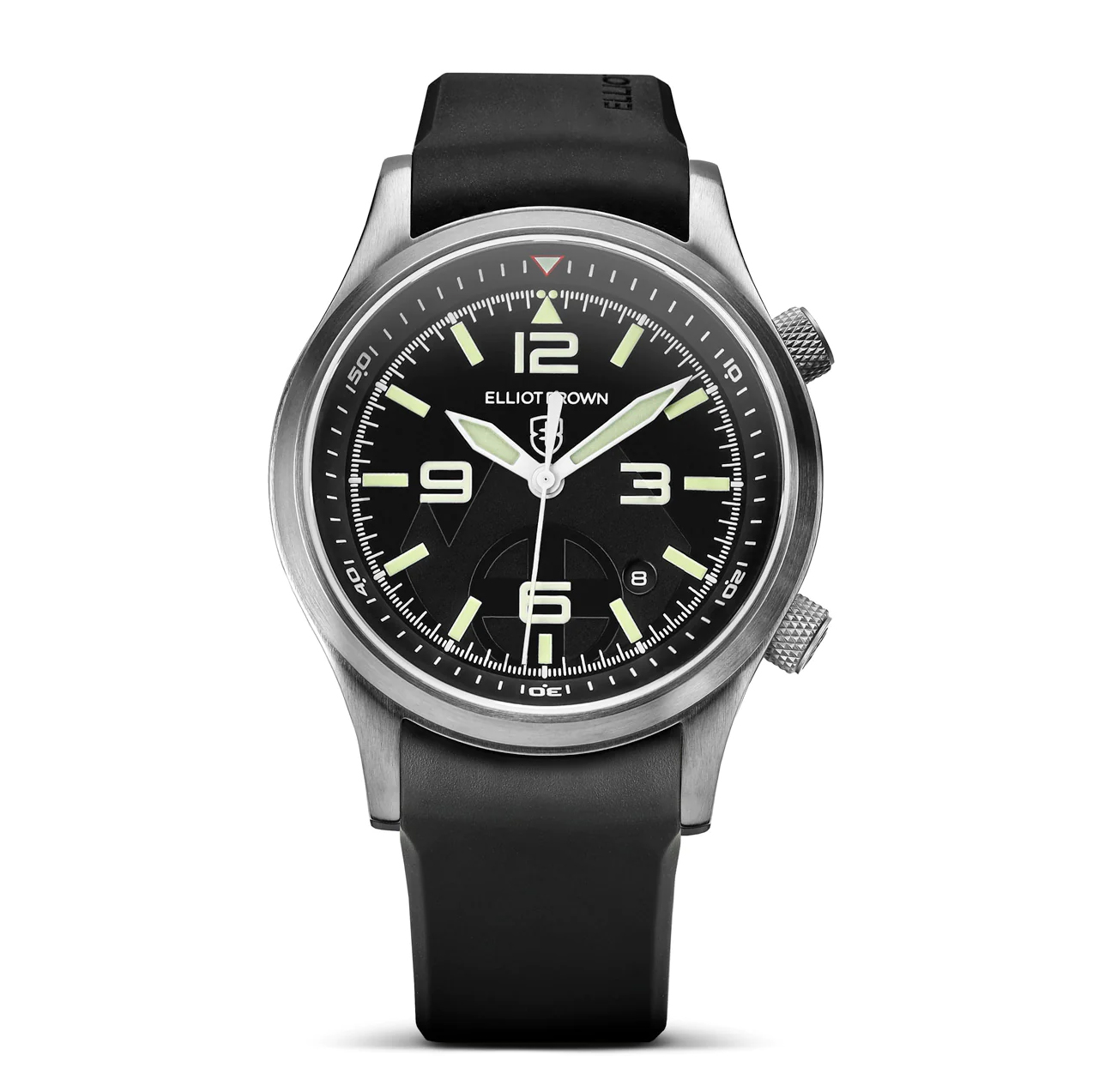
Tried and tested by Britain's Mountain Rescue services, we love this robust and clear field watch for challenging outdoor adventures
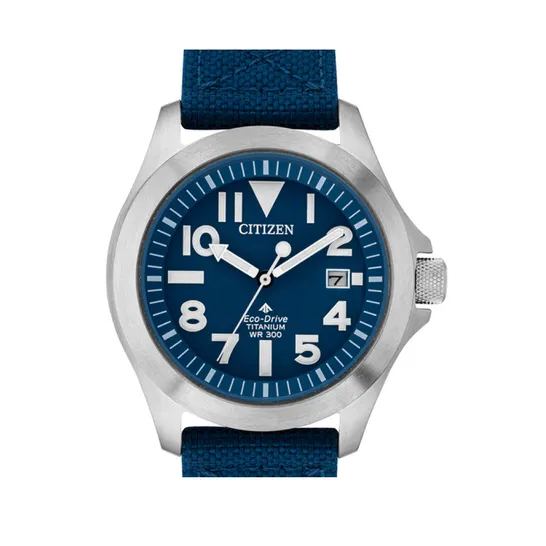
We love this watch, which combines great specs and top-notch, hugely robust build quality with a rugged but unassuming style that'll fit in at the office
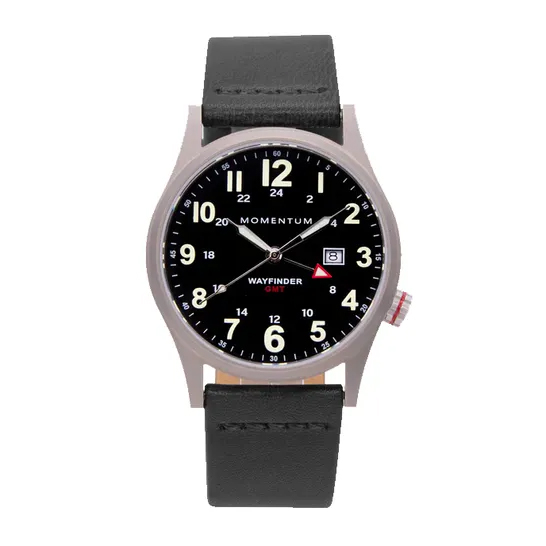
A modern field watch, with an adventure-ready titanium case and useful second time zone functionality, which we think represents great value for money
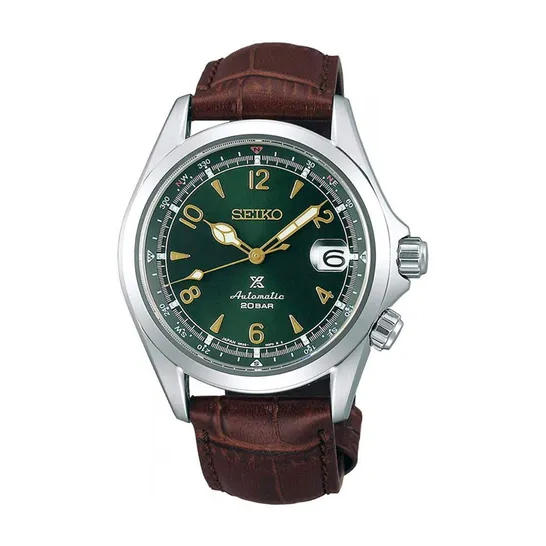
We like the no-nonsense appeal of this tool watch, which is shock protected and has refined design flourishes for a touch of class
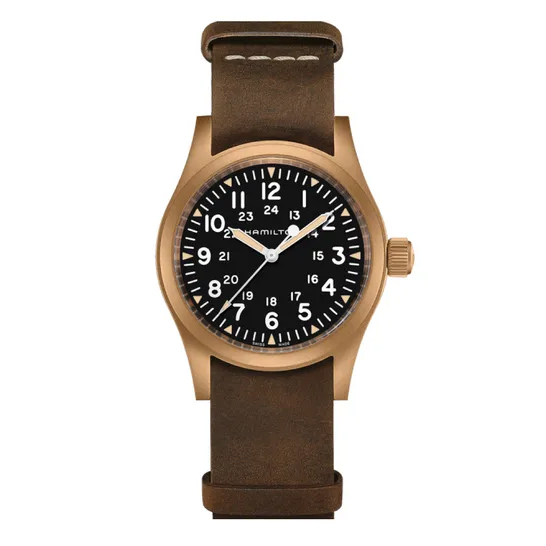
A faithful reinterpretation of arguably the most iconic field watch around, which we think has been enhanced with a little touch of magic
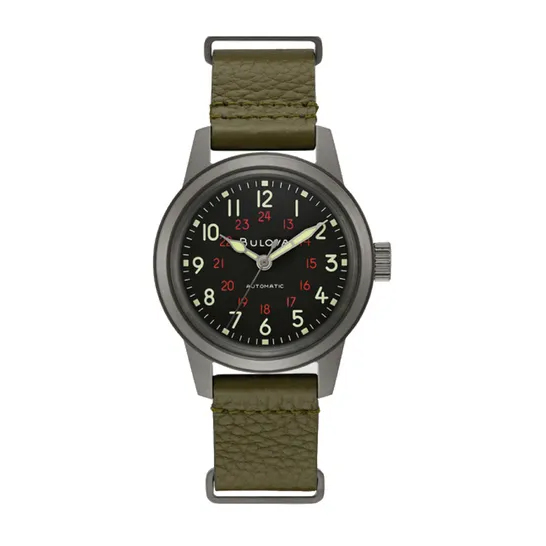
We love this handsome little field watch, which combines wartime heritage with modern materials and a robust automatic movement
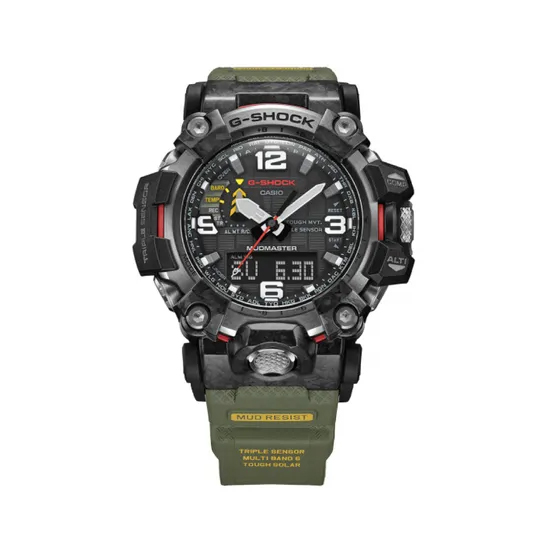
While we think the Mudmaster may lack the charm of a classic field watch, in all other respects it outperforms most of the competition
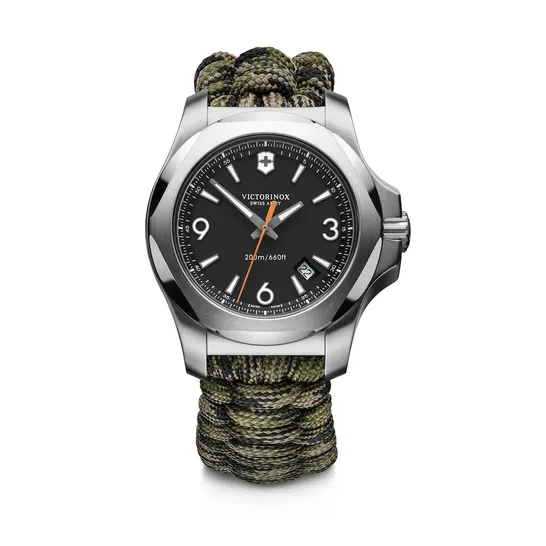
We found this Swiss-made beast very impressive and it's been designed to survive over 130 endurance tests, including being driven over by a 64-ton tank…
The best field watches 2025
You can trust Advnture
The best field watch overall
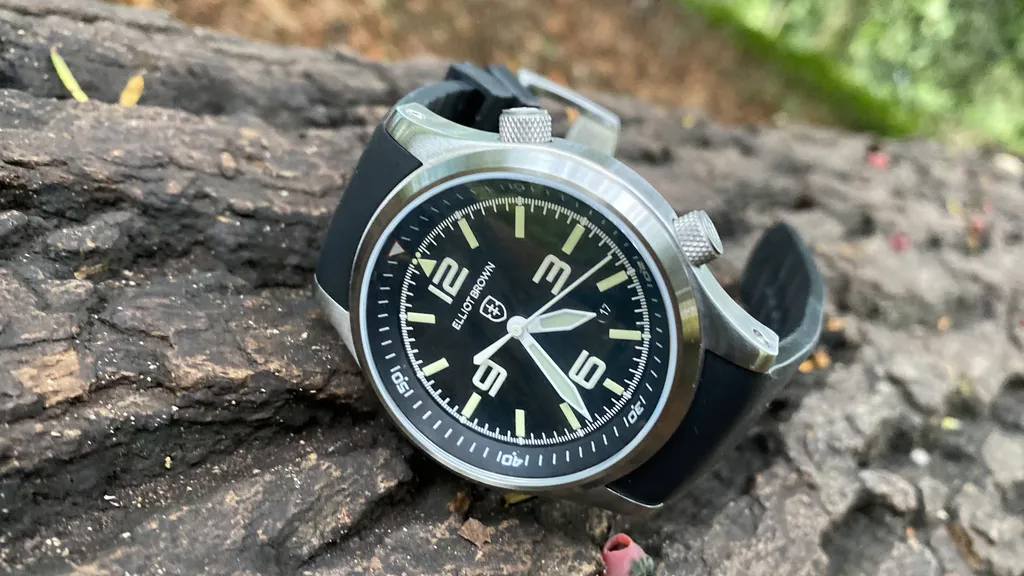
Specifications
Reasons to buy
Reasons to avoid
There’s no doubt about it, the Mountain Rescue Edition of the Canford has a bold appearance. Enlarged hour batons, luminous markings and bright white hands filled with green SuperLuminova makes for outstanding visibility. Even in low light, we found it easy to instantly read the time.
The reason for this bold and bright design is the collaboration between Elliot Brown and Mountain Rescue England & Wales. In its engine room, there's a Swiss 5-jewel Ronda 715 quartz movement, which is protected by a housing surrounded by shock-absorbing elastomers. So, in other words, it's a highly durable and accurate mechanism that will withstand a hell of a lot of abuse. "Freezing winter conditions and long days in the rain are its bread and butter," said our expert reviewer.
The watch is also water-resistant to the ISO 2281 standard and pressure tested to 200m for 10 minutes. In short, this is timepiece that can join you on your wild swims, river crossings and hikes through Scottish deluges. All in all, the Canford is a classy, robust and easy to read field watch that's totally at home in the city, yet excels when hiking in the mountains. Virtually indestructible, it won’t fail you no matter how extreme your adventure – there’s a reason Mountain Rescue members wear them.
Read our full Elliot Brown Canford Mountain Rescue Edition watch review
The best field watch for robustness
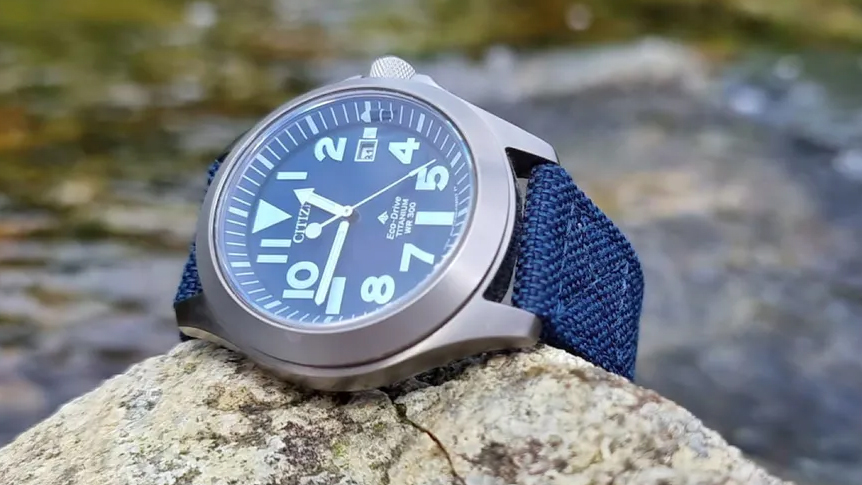
Specifications
Reasons to buy
Reasons to avoid
This watch definitely has a function-first design, with a matte dial, large numeric indices and a simple handset, all housed in a compact monobloc case. However, the watch’s specs and build quality are "seriously impressive" according to our expert tester. The case is made from “Super Titanium”, which we found to be lightweight yet extremely strong, with excellent anti-magnetic, hypoallergenic and corrosion-resistant properties. It has an impressive water resistance of 300m, while a flat sapphire crystal offers plenty of scratch resistance.
Inside, it runs on Citizen’s famous Eco-Drive movement, a solar quartz assembly powered by sunlight that we think is a great choice for off-grid adventures and means never having to worry about replacing a battery.
All in all it’s a great multi-activity watch for use in the water or on land, and one that feels as solid as a G-Shock or a Victorinox INOX, despite being half the price of either of those rivals. The Citizen is also significantly lighter and smaller on the wrist, which arguably makes it an even more practical proposition for many activities.
Read our full Citizen Promaster Titanium Tough field watch review
The best value field watch
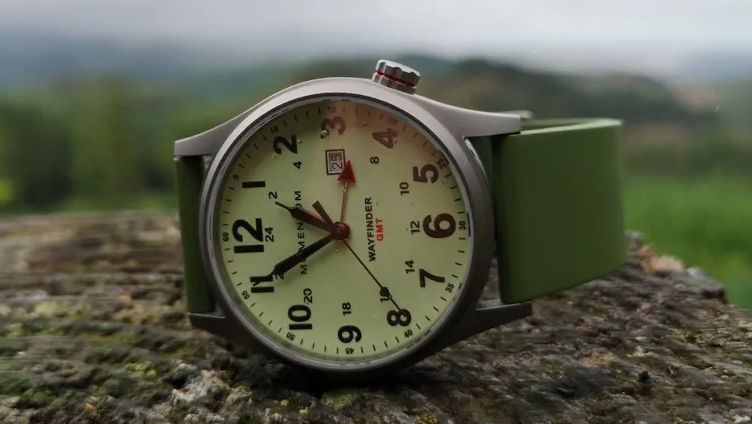
Specifications
Reasons to buy
Reasons to avoid
Momentum is an up-and-coming Canadian watch brand, and we think the Wayfinder is of their most attractive and adventure-ready timepieces. It’s a military-inspired titanium field watch that is tough and legible but also handsome, with a purposeful dial and rugged-looking matte titanium case. The specs and functionality are good too – you get a Swiss-made quartz movement with a GMT function and a date window, plus a sapphire crystal and a decent 100M of water resistance. In short, "there’s plenty of bang for your buck here," according to our expert tester.
We particularly like the GMT function, which means the watch has a fourth pointer hand that can be set to track a second time zone via the inner 24-hr track on the dial. This is a useful feature for travellers and adventurers.
The watch is also an ergonomic and comfortable companion on the wrist, as well as being extremely lightweight. Low-light legibility is great too, particularly if you opt for the white full lume option. The dial literally glows in the dark, making this a great choice for camping and night hiking. All in all, this is a great little tough, rugged and handsome timepiece for modern adventurers.
Read our full Momentum Wayfinder GMT review
The best field watch for style
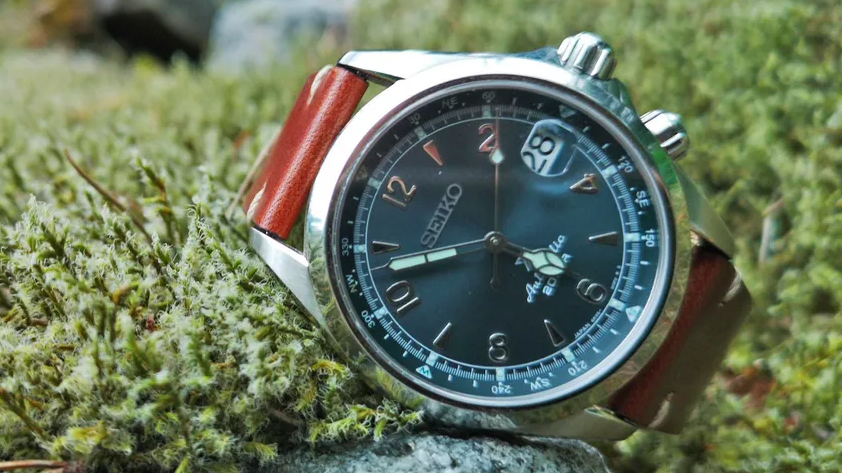
Specifications
Reasons to buy
Reasons to avoid
The Alpinist is a compact and wearable piece, even if you don’t have huge climbers’ wrists. We also found it to be surprisingly elegant, with some dressy design flourishes. The latest version also has upgraded specs such as a highly scratch-resistant sapphire crystal with a cyclops date window, as well as Seiko’s in-house 6R35 automatic self-winding movement, which boasts an impressive 70-hour power reserve.
Then there’s the internal compass bezel, a distinctive feature which is operated by a secondary crown positioned at 4 o’clock. And despite being primarily made for use on terra firma, the watch still has an excellent water resistance rating of 200m – as good as many of the brand’s specialist divers’ watches.
The build quality is as solid as you’d expect from Seiko, too. So, this is a reliable outdoor companion, but one that’s far more than just a tool, with an eye-catching dial that offers both style and elegance. In that sense, this is a versatile watch that our expert tester thinks "could go easily from the office work wardrobe to adventurous weekend wear."
Read our full Seiko Alpinist review
The best field watch for classic looks
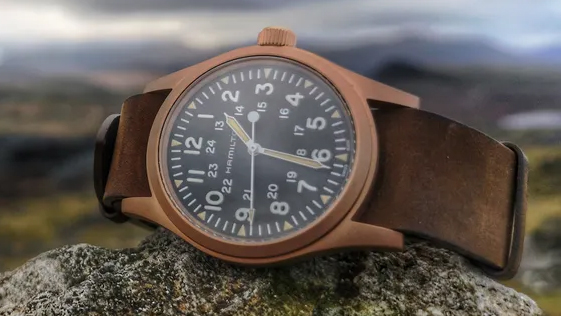
Specifications
Reasons to buy
Reasons to avoid
This Swiss-made field watch is already a bona fide classic. But with this latest release, Hamilton have sought to add another dimension to the iconic Khaki Field Mechanical. This version has a gorgeous bronze case that will develop a unique patina the more you wear it, as the metal darkens and oxidizes with age. It means that the watch on your wrist will do more than tell the time – it will also tell a story of all your adventures too.
Of course, with its vintage looks and hand-wound mechanical movement, this watch is undeniably a bit of a throwback. But we still found it to be surprisingly practical: the dial is highly legible, while the movement has an impressive 80-hour power reserve, meaning when fully wound, it’ll run for just over three days before you’ll need to wind it again. The sapphire crystal is highly scratch-resistant, and that bronze case is fairly tough yet very light. A titanium case back cuts further weight.
In short, it’s "a great-looking piece with plenty of heritage appeal" according to our reviewer. If you’re attracted to the idea of owning a mechanical watch and are willing to splurge a little on a daily wearer with oodles of charm and character – one that’ll dress up for the office or down for weekend adventures – this little Hamilton will be a cherished companion.
Read our full Hamilton Khaki Mechanical Bronze review
The best compact field watch
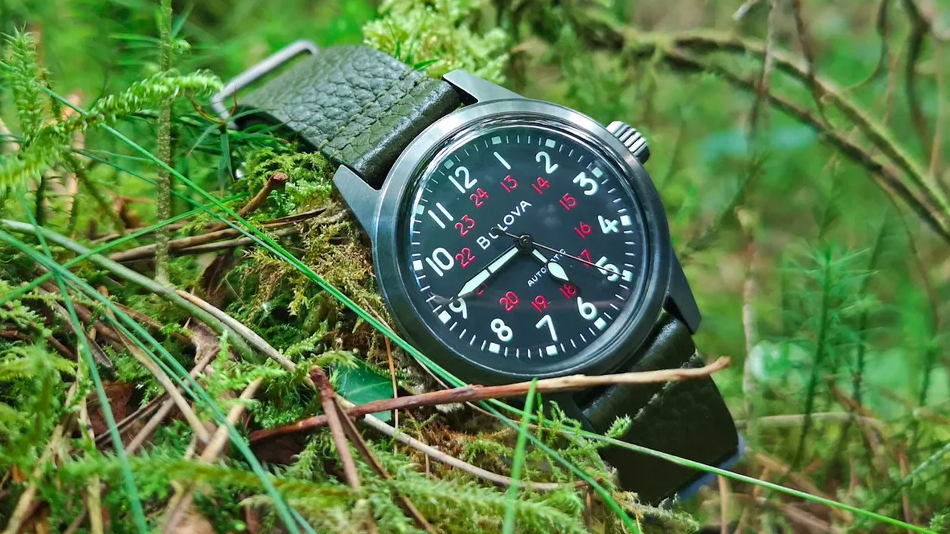
Specifications
Reasons to buy
Reasons to avoid
The Bulova Hack is a modern update of an authentic military-spec field watch that was originally issued to US soldiers back in World War Two. It retains the compact proportions and vintage looks of the original, but now has a modern automatic movement housed in a stainless-steel case with a handsome gunmetal finish.
Given its bona fide wartime heritage, it should come as no surprise that we found the Hack works pretty well as a modern field watch too. The high contrast dial is simple yet functional, with a 24-hour military time track and a luminescent finish to ensure good nighttime readability. It feels unobtrusive on the wrist, meaning we were happy strapping it on for everyday wear. But the watch is still hefty enough to deliver good wrist presence, aided by a high-quality leather strap that is "both comfortable and stylish" according to our expert tester.
All in all, it’s a well-built, good-looking timepiece that carries similar vintage military appeal to the Hamilton Khaki, without such a steep price tag.
Read our full Bulova Hack field watch review
The best G-Shock field watch
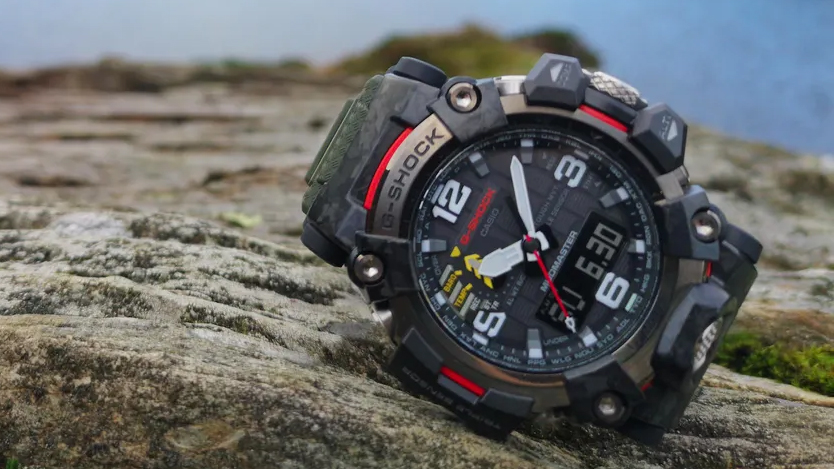
Specifications
Reasons to buy
Reasons to avoid
Okay, whether it’s technically a field watch is debatable, but the G-Shock Mudmaster is arguably the archetypal outdoor watch. And it is much loved by military types, so it has probably seen more field service than most rivals. Plus, the latest flagship model in the Mudmaster series, the GWG-2000, is tougher than ever and ought to outlast even the most rugged smartwatch – as will its solar quartz movement, which will run for up to six months even in total darkness.
And while it’s not quite as clever as a GPS-equipped smartwatch, we found that it's still pretty sophisticated, with a host of built-in tools such as a compass, altimeter, barometer and thermometer. The burly case is made from carbon fiber resin, providing impressive shock and impact resistance as well as water resistance up to 200m / 20ATM.
"It’s a bit of a brute on the wrist," according to our expert tester, and there are few concessions to style or looks, though the overbuilt design will undoubtedly appeal to some. It might also carry more functionality than many users will need. But if you want all the features of its on-board tech and appreciate its über-tough build, then there’s probably no better all-round outdoor watch out there.
Read our full G-Shock Mudmaster GWG-2000 review
The best rugged field watch
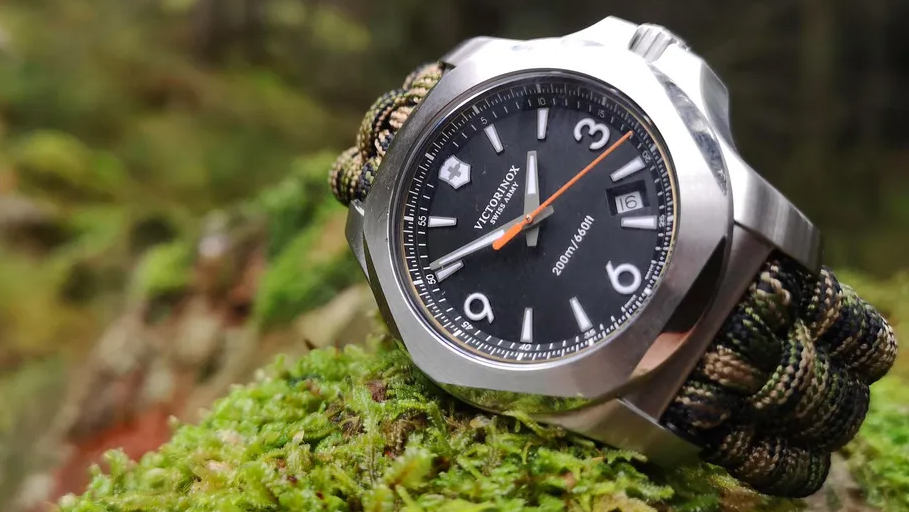
Specifications
Reasons to buy
Reasons to avoid
We pretty sure Swiss brand Victorinox didn’t hold back when creating this rugged yet thoroughly modern tool watch. Want proof? Well, during the design process it was subjected to over 130 endurance tests, including being driven over by a 64-ton tank and tested in extreme temperatures ranging from -57C to 71C (-70F to 160F). With its stainless-steel case (or inoxydable in French, hence the INOX designation), sapphire crystal, screw-down crown, shock-resistant movement and 200m / 660ft of water resistance, it’s intentionally overbuilt, ensuring suitability for any adventure, no matter how demanding.
As you might expect then, the result is a watch with rugged, no-nonsense looks and a chunky, muscular appearance. That won’t suit everybody, but while it may not be the most elegant timepiece out there, it should withstand a lifetime of hard knocks. And if you’re looking for an utterly dependable and unapologetically rugged watch with genuine Swiss-made heritage, "look no further" according to our expert tester.
Read our full Victorinox INOX Autumn Spirit review
The best field watches comparison table
Watch | RRP | Weight | Water resistance |
Elliot Brown Canford Mountain Rescue Edition | £385 | 133g / 4.7oz | 200m / 20ATM |
Citizen Promaster Titanium Tough | £299 (UK) | 133g / 4.7oz | 300m / 990ft |
Momentum Wayfinder GMT | $235 (US) / £177 (UK) | Not stated | 100m / 330ft |
Seiko Alpinist | $725 (US) / £650 (UK) | 84g / 3oz | 200m / 660ft |
Hamilton Khaki Mechanical Bronze | $825 (US) / £720 (UK) | 65g / 2.3oz | 50m / 5 ATM |
Bulova Hack | $316 (US) / £289 (UK) | 67g / 2.36oz | 30m / 100ft |
G-Shock Mudmaster GWG-2000 | $800 (US) / £699 (UK) | 106g / 3.7oz | 200m / 20 ATM |
Victorinox I.N.O.X. “Autumn Spirit” | $650 (US) / £549 (UK) | 133g / 4.7oz | 200m / 660ft |
Meet the testers

Matt has been testing outdoor gear for around a decade and is a big advocate for the simple elegance of a field watch. He's a seasoned thru hiker, having walked, hiked and scrambled all 298 miles of the Cambrian Way in one go. He values the being able to trust a watch that doesn't need to be charged during adventures.

Alex is a qualified Mountain Leader who knows that when the going gets challenging, simplicity is what's called for. He loves the virtual indestructible nature of a field watch, meaning he can trust it to keep on telling the time no matter where he's exploring. He's a classy lad too, so the aesthetic of a timeless field watch obviously appeals.
How we test the best field watches
We wore each watch for at least two weeks straight, both day and night. They came with us on a variety of outdoor adventures, from hiking and hillwalking to wild camping, scrambling and climbing. Where a watch guaranteed a minimum water resistance of 100m (10 Bar or 10 ATM), which is generally considered to be the benchmark for a surface-water swimming watch, we also plunged into various lakes and rivers.
Though we didn’t set out to test each watch to destruction, daily use came with an inevitable series of bumps and knocks. We assessed how well the watches fared when subjected to such typical use, paying particular attention to durability of the case, strap and crystal, as well as general timekeeping performance.
How to choose the best field watch
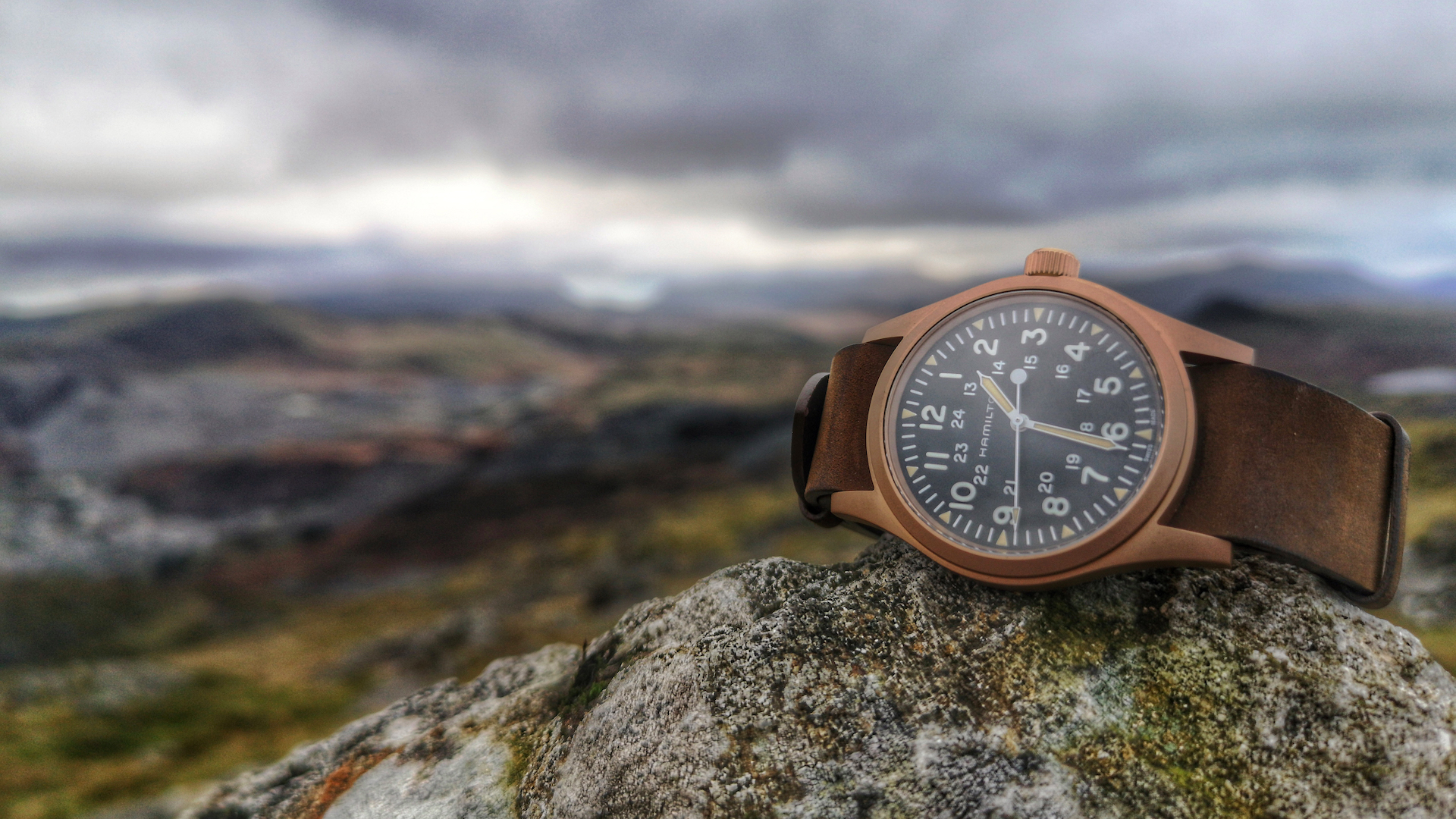
All of the best field watches are designed to provide rugged and reliable timekeeping. Some clearly draw on the field watch’s military heritage, being faithful to original early 20th-century designs, while others present a more modern take on the field watch concept. But every watch is slightly different – and wears differently too, depending on its case size, weight, movement and functionality.
We've compiled a series of frequently asked questions about field watches, to help you make your choice.
How much should I pay for a field watch?
When it comes to watches, prices vary greatly. Luxury watches can cost thousands, tens of thousands or even hundreds of thousands of dollars. However, we’ve capped our selection of best field watches at $1,000, recognizing that most adventurers probably won’t be making for the mountains with a luxury timepiece strapped to their wrist.
How much should you spend? Only you can decide that, but without trying to sound cliché, in general you get what you pay for, in terms of build quality, finishing and also residual value. But bear in mind that most field watches ought to last you a lifetime, and they start to look like a very good investment.

What is the movement in a field watch?
The watch’s movement is another one of the key factors to consider. This is the internal mechanism that operates the watch. Movements can be either quartz or mechanical. Quartz movements are very accurate and powered by a long-life battery, with few moving parts. This means they are usually more rugged than most mechanical movements. Typical battery life for a quartz watch is two to three years.
Some watches use solar quartz movements, which feature solar cells embedded into the dial to power the watch. This eliminates the need for battery changes and makes solar-powered watches a great choice for outdoor adventurers.
A more traditional alternative is a mechanical watch. Mechanical movements use energy from a mainspring to power the watch. This spring stores energy and transfers it through a series of gears and smaller springs. Mechanical movements can be manual (hand-wound) or automatic (self-winding). In theory, provided you wear it or wind it regularly, a mechanical watch will run forever – though in practice, they’ll usually require servicing every three to five years.
An easy way to tell a quartz from a mechanical movement is by looking at the seconds hand. Quartz watches have a regular “ticking” seconds hand, while mechanical watches have a smooth, sweeping seconds hand. All modern movements, quartz or mechanical, are usually shock-resistant, designed to pass a minimum standard, which is to survive a drop of 1m onto a hard floor. But additional shock absorbing components can be added to further protect the movement from more extreme impacts.
What water resistance should I look for in a field watch?
Remember that most field watches were primarily designed for use on terra firma. Many have modest or even good water resistance, but if you spend a lot of time in or on the water, you might be better served by the other classic tool watch – a dive watch. After all, a watches place in on your wrist, not in a dry bag. On the other hand, if you like the rugged, no-nonsense military aesthetic of a field watch, and their generally modest and wearable proportions, they make a great “daily driver”.
What are the parts of a field watch?
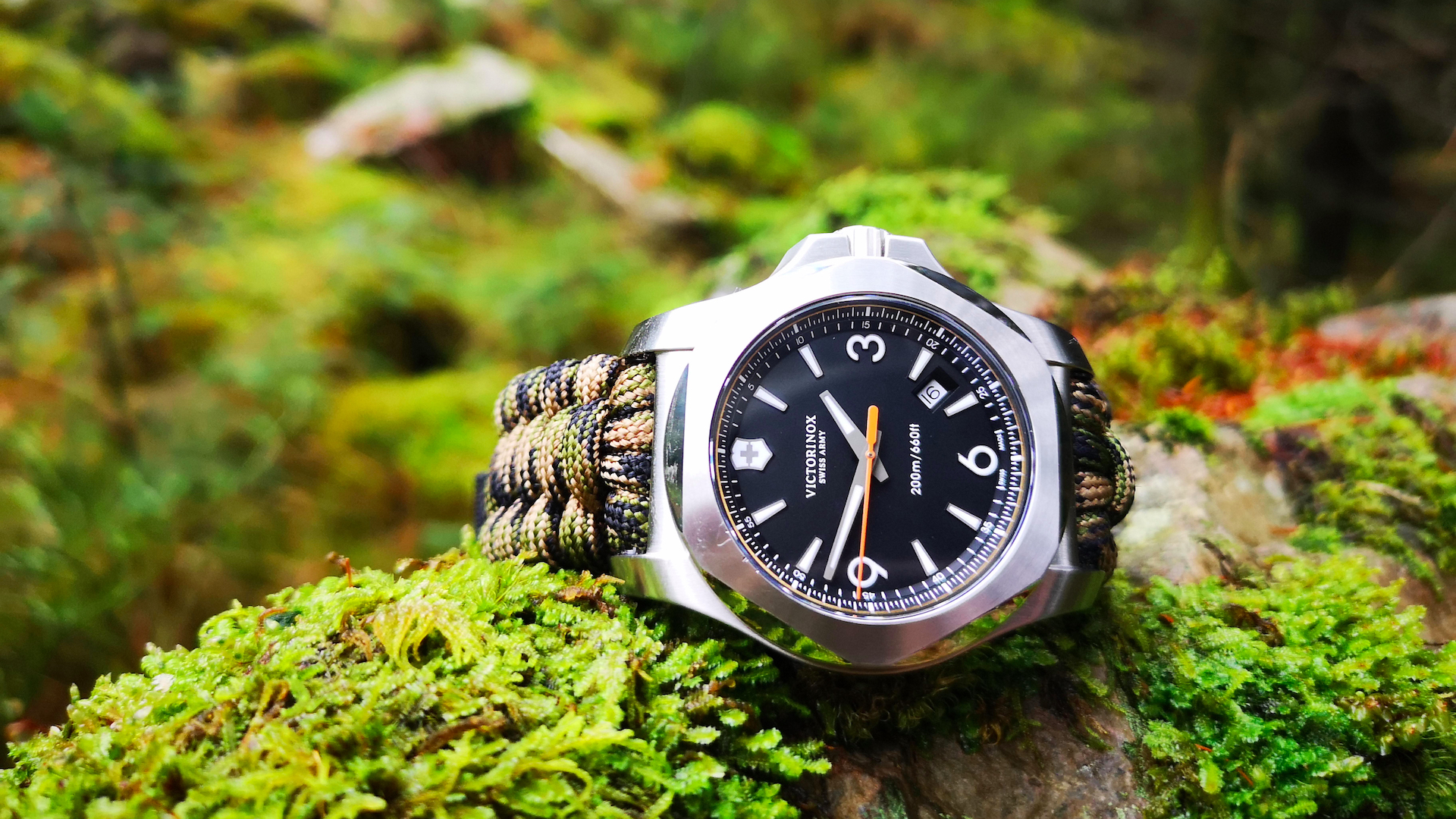
Case
The case or body of a field watch is usually made from a strong material such as stainless steel. The most common choice is 316L or marine-grade steel, which provides good resistance to corrosion, as well as being anti-magnetic. However, lightweight alternatives to steel include titanium, which has an incredibly high strength-to-weight ratio, and even carbon fiber, though impact-resistant thermoplastics and other metals such as bronze are sometimes used too.
Traditionally, field watches are relatively slim and compact, so they are lightweight and unobtrusive on the wrist. This usually means a case diameter of between 36mm and 42mm. There are exceptions to this, of course, and overbuilt watches like the ubiquitous G-Shock are known for their large proportions.
Caseback
Though they’re primarily designed for use on terra firma, most field watches usually have a screw-down or bolt-down case back with an inner waterproof seal or gasket to ensure some degree of water resistance.
Crystal
The transparent face of a watch is called the crystal. Most are made of either acrylic, mineral glass or synthetic sapphire. All have different benefits – acrylic tends to bend under pressure rather than cracking or shattering, but scratches easily. Glass, especially hardened mineral glass, is more scratch-resistant and highly impact-resistant. Sapphire crystals are the most expensive, generally reserved for premium watches. It is an incredibly hard material, which makes it highly scratch-resistant. All crystals are usually finished with an anti-reflective coating to reduce glare and reflection, enabling you to see the dial even when viewed from oblique angles.
Bezel
The bezel is a metal ring surrounding the watch face that protects the crystal. On tool watches, it often has additional timekeeping functionality, for example with 0 to 60 or 24-hour scales.
Crown
The crown is used to set the time and date, and also to wind a mechanical watch. Field watches usually have an easy-grip crown, but it is often recessed or protected by crown guards to avoid damage. In addition, a screw-down crown may be fitted, typically with internal gaskets to boost water-resistance.
Dial
The primary function of a watch is to tell the time, obviously. Field watches are designed to be clearly legible and readable even in low light conditions or in bright sunshine. This usually means a high-contrast dial with few decorative elements. Field watches often have a 24 hour scale too, reflecting their military origins. Lumed or backlit dials also ensure good nighttime performance, enabling you to see the time even in pitch black.
What to do with your old watch
If your old watch is still in working condition, selling or donating it are both good options. There are various charities that specialize in reselling watches and putting the proceeds to good use, such as Watches for Charity in the UK. Some charity and thrift stores also accept working watches.
If your watch is no longer ticking, you can send it to a recycling scheme like Recycling for Good Causes, or take it to a household recycling center. Your council or local authority will be able to give details.
All the latest inspiration, tips and guides to help you plan your next Advnture!
An outdoors writer and editor, Matt Jones has been testing kit in the field for nearly a decade. Having worked for both the Ramblers and the Scouts, he knows one or two things about walking and camping, and loves all things adventure, particularly long-distance backpacking, wild camping and climbing mountains – especially in Wales. He’s based in Snowdonia and last year thru-hiked the Cambrian Way, which runs for 298 miles from Cardiff to Conwy, with a total ascent of 73,700 feet – that’s nearly 2½ times the height of Everest. Follow Matt on Instagram and Twitter.

